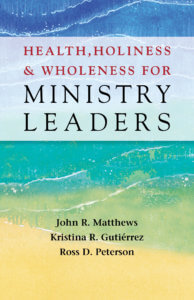A strong leader is often defined as one who uses authority to gain influence and advantage. John Matthews, Kristina Gutiérrez, and Ross Peterson point to a different paradigm of strength in church leadership that is neither defensive nor aggressive but loving and respectful of one’s adversaries.
1. Strength is knowing whatever the outcome of any situation, you will be okay.
The source of this strength brings peace and is ultimately spiritual. Read Romans 8 over and over again. This particular strength allows you to let go of any preferred outcome for whatever you are doing. You may want to give it your best effort because of how much you care, but things do not have to go your way. You leave others with total freedom to make their own responses. That is respectful, and that is strong. If you have a conflict, you do not have to win. Weakness is the inflexible need to have things go your way. A person who has to win — who cannot stand to lose — is a dangerous, desperate person and is in a severely weakened position. Conflict almost always brings with it the possibility of a really good, perhaps unexpected, outcome.
2. Strength is acting out of kindness and love.
Where kindness abounds in any relationship, that relationship can withstand an enormous amount of stress. It can tolerate disagreements and live through conflict. Weakness is acting out of heat or meanness. Where hate and meanness prevail in a relationship, the relationship is brittle, and cooperative effort is all but impossible.
3. Strength is always attributing the highest motives to other people regardless of actions.
If we do not follow this rule of strength, we descend into the world of hate ourselves. Hate poisons our spirits and diminished every other strength on this list. We are left in a weakened position. And our chance of becoming peacemakers evaporate. Weakness, therefore, is considering only our immediate, surface, and often fearful reaction to what others are doing. When we attribute the highest motives to people, it increases a hundredfold our ability to live and work with them.
4. Strength is helping others take the strongest stand they can take for themselves.
If we encourage all parties in a conflict to articulate their positions from a place of strength, as we’ve outlined above, then a resolution is likely to emerge that is beneficial to all. Even if you yourself are on one side of a conflict, excellence is possible if you help the other side take as strong a stance as possible. Weakness is hoarding health and excellence for yourself, believing its benefits are intended only for you.
5. Strength is being open, direct, and transparent.
This rule of strength relates directly to your intentions. Being open with your intentions is certainly to your advantage, but it also helps others. They know who you are and why you are doing what you are doing. Their trust of you grows rapidly with your openness. Accordingly, people will grant you a great deal of leeway as long as they know you are being guided by the stated intentions. In seeing clearly where you are headed, they will know better how they might join you or support you. Weakness is being indirect, beating around the bush as if you want others to take responsibility for guessing what you would rather not say or operating with a hidden agenda. What is hidden generally comes out in the open and, feeling tricked, people have second thoughts about trusting you.
6. Strength is knowing and honoring your own limitations.
Certainly, knowing the limits of what you can do or endure physically is important, but what is most important here is honoring limits to our privilege and our importance. Weakness is buying into the notion that you have special importance over and above other members of the community of faith.
7. Strength is taking responsibility.
If knowing that you will be okay, no matter what, is the most important strength, this one is a close second. To use this strength fully requires working with a different concept of responsibility than we are accustomed to. If we claim to belong to God’s family, then we are responsible to and for every creature under God’s heaven. We can choose either to own that responsibility or not, but strength means owning it. Weakness is blame. The kind of responsibility we are talking about here is a mature responsibility – a responsibility that stems from acknowledging our connection with others, that is, an extension of our care that’s not based on guilt or obligation.
8. Strength is being patient.
When something important comes along, strength is saying, “Take all the time you need.” Weakness is dawdling over the trivial and hurrying through the important. The truly important often comes up as a surprise and needs both time and patience to come to fruition.
9. Strength is being active, doing something.
Do not linger in unproductive annoyance. Plan to do something, sit with your plan long enough to be confident in it, then do it! Weakness is endlessly brooding, worrying, and sinking deeper and deeper into passivity. Procrastination, guilt, worry, fear, and self-concern all get in the way of being active or acting from a position of strength. Some things need to be left alone, that is true. Deciding to do nothing is, in fact, doing something if it is an intentional action.
10. Strength is inviting critique.
Strength is being open with your intentions, asking people to help you by appraising your intentions, and then asking them to let you know when your actions do not seem to match your intentions. You will appear strong when you give this invitation and then receive those who take you up on it with genuine grace and appreciation. Weakness is seeking only praise or positive feedback and attempting to remove yourself from any situation where you might be criticized.
11. Strength is inviting others to join you.
There is strength in numbers. To say to yourself “I’m the only one who can do it” is not only arrogant, it is weak. Some parts of ministry are mundane and, let’s face it, boring! Inviting other in on those parts is called delegating. Other parts of your ministry are challenging, intriguing, fulfilling, even exciting. Inviting others to join you is a gift to them and a gift to yourself. Weakness is flying solo, believing you’re the only one who can do it right.
12. Strength is listening deeply.
The church, perhaps more than anything else, needs to be a listening church to fulfill its mission. Everyone’s experience is unique. Everyone’s point of view is unique. Weakness is listening only to ourselves. Choose to listen deeply and they will talk. And the product of that talk can lead to improved relationships and the ability to love and be loved.
 Excerpted from Health, Holiness, and Wholeness for Ministry Leaders by John R. Matthews, Kristina Gutiérrez, and Ross D. Peterson, copyright © 2020 by Judson Press. Used by permission of Judson Press, 800-4-JUDSON, www.judsonpress.com.
Excerpted from Health, Holiness, and Wholeness for Ministry Leaders by John R. Matthews, Kristina Gutiérrez, and Ross D. Peterson, copyright © 2020 by Judson Press. Used by permission of Judson Press, 800-4-JUDSON, www.judsonpress.com.
Related Resources
- 12 Practices to Cultivate Humble Leadership by David Horner
- The 4 “C’s” of Impactful Leadership by Doug Powe
- 5 Suggestions for Managing Conflict in Polarized Contexts by David R. Brubaker







